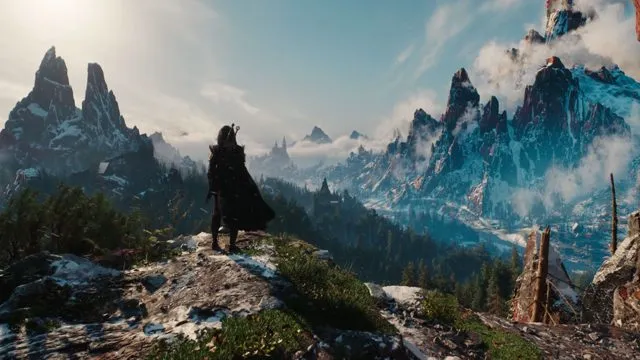The Witcher 4: A Glimpse into the Future of Gaming
The Witcher franchise, known for its rich narratives and expansive game worlds, has captivated players globally since its inception. As we edge closer to the much-anticipated release of The Witcher 4, fans have been treated to a stunning new tech demo running on Unreal Engine 5 that not only showcases the graphical capabilities but also the performance of this open-world RPG on base PlayStation 5. With the promise of 60 frames per second and ray tracing effects, players are buzzing with excitement.
Unreal Engine 5: Revolutionizing Gaming Experiences
Released by Epic Games in early access back in 2021, Unreal Engine 5 has been touted as a game-changer in the world of video game development. With tools like Nanite for rendering intricate details and Lumen for dynamic lighting, developers have access to unprecedented power to create breathtaking visuals. The recent Unreal Fest 2025 showcased various demos, and The Witcher 4 stood out as a pinnacle example of what this engine can achieve.
Gameplay and Graphics: A Marriage of Technology and Art
The fresh trailer and gameplay footage reveal an ambitious direction for the RPG. CD Projekt Red, the developers behind The Witcher series, have highlighted their commitment to delivering an immersive experience that transcends previous iterations. The open world appears to be teeming with life, from bustling towns to the sprawling wilderness, all rendered in stunning detail.
Players can expect an expansive environment that invites exploration. The demo shows numerous terrains, including lush forests, mountainous regions, and eerie swamps that echo the series’ signature atmosphere. The intricacies brought forth by Unreal Engine 5 permit the developers to model environments with an unmatched level of fidelity.
Performance on Base PS5: Breaking New Grounds
One of the most exciting aspects of the tech demo is the performance metrics. Executing at 60 FPS on a base PS5, The Witcher 4 achieves a smooth and fluid gameplay experience that many thought was reserved for higher-end hardware. This feat signifies the power of optimization and the efficiency of Unreal Engine 5. Ray tracing support adds another layer of depth, enhancing reflections, shadows, and ambient occlusion, dramatically improving the overall visual quality.
Ray Tracing: Lighting Up the World of The Witcher
Ray tracing has become a hallmark feature in modern gaming, providing a level of realism that traditional rendering methods cannot match. The Witcher 4’s implementation of ray tracing exhibits how light interacts with surfaces and environments, leading to incredible visual fidelity. This technology brilliantly simulates how light behaves in a physically accurate manner, resulting in environments that feel authentic and vibrant.
Unleashing the Power of Storytelling
Beyond visuals and performance, one of the franchise’s enduring appeals is its rich storytelling. The Witcher 4 is set to continue this tradition by intertwining compelling narratives with player choices that impact the world. CD Projekt Red has hinted at new characters, expansive quests, and deeper lore, all of which are set to unfold within this awe-inspiring open world.
The intriguing aspect of the new storyline is its potential to explore uncharted territories within the Witcher universe. Players will likely encounter new factions, monsters, and moral dilemmas. The choices players make could lead them down paths filled with consequences, remaining true to what fans have come to love about the franchise.
Comparative Analysis: Evolution of The Witcher Series
Looking back at previous installments, each iteration of The Witcher has pushed the envelope further, whether it’s with improved graphics, deeper gameplay mechanics, or expansive lore. The Witcher 3: Wild Hunt, released in 2015, was hailed as one of the best role-playing games of all time, largely due to its immersive world and storytelling.
The Witcher 4 appears to aim for the same heights, if not surpass them. The jump to Unreal Engine 5 not only enhances graphics but also paves the way for superior integrated systems such as AI behavior, NPC interactions, and event-driven storylines. Players can expect a more organic and responsive game world where their actions have genuine weight.
Anticipation and Community Buzz
Social media and gaming forums have been abuzz with excitement ever since the demo was revealed. Fans are eager for deeper insights into the mechanics, character development, and overall world-building that The Witcher 4 promises to deliver. The sentiment shared among the community echoes a profound respect for CD Projekt Red’s knack for crafting stories that resonate with audiences.
As the countdown to the game’s release continues, industry analysts speculate on how The Witcher 4 may redefine open-world gaming. What is evident is that CD Projekt Red has embraced new technologies to create an experience that honors the legacy of the franchise while forging a path into the future.
Conclusion: A New Dawn for The Witcher Franchise
The Witcher 4 is shaping up to be an impressive addition to the beloved series, with its combination of Unreal Engine 5 technology and the gameplay enhancements that come with it. The focus on 60 FPS and ray tracing on the base PlayStation 5 speaks to the dedication of CD Projekt Red to reach as many players as possible while still delivering a polished, high-quality gaming experience.
As anticipation builds, players are reminded of the magic of The Witcher universe—a blend of compelling stories, visceral gameplay, and breathtaking visuals. The promise of The Witcher 4 invigorates not only old fans of the series but also new players eager to dive into a world of adventure.
In this digital age, where advancements in technology are a daily occurrence, The Witcher 4 signifies a perfect storm of innovation and creativity—one that is sure to leave an indelible mark on both the franchise and the gaming industry at large.






